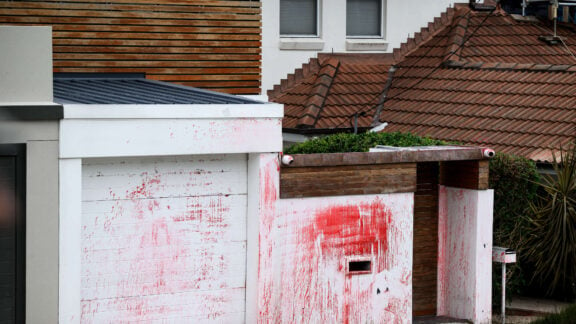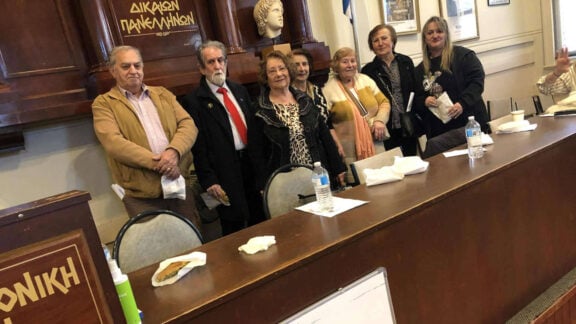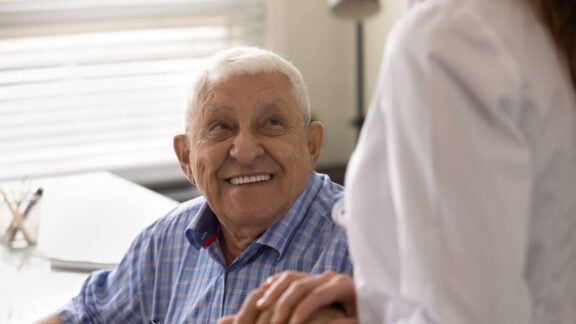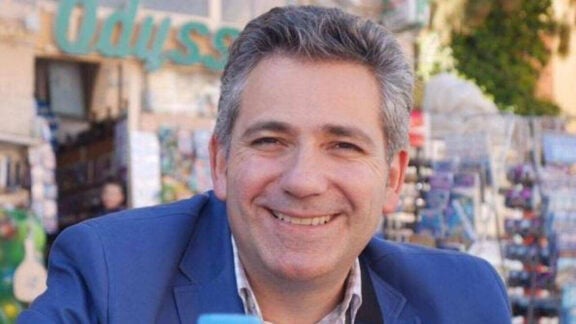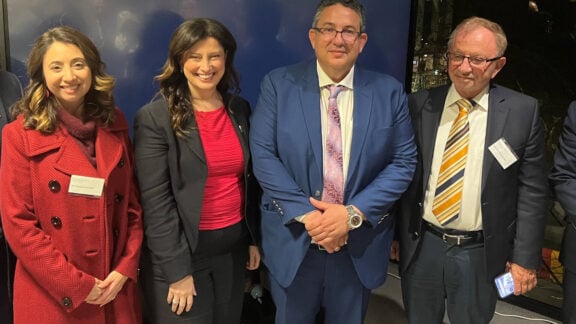The table in Vanilla cafe, Oakleigh, was covered with koulouria, tsourekia, butter biscuits, chocolate bunnies, red eggs, and lambastes – a postcard Pascha table– in honour of the Victorian premier Jacinta Allan’s visit.
“I will have one of those,” the premier said as she sat – her eyes fixed on a chocolate-dipped butter biscuit.
“You have the chocolate, and I take the other – deal,” said a pragmatic and seasoned negotiator.
The minister for tourism flanked Premier Allan, Steve Dimopoulos –the local member – and Nick Staikos, her parliamentary secretary and member for Bentleigh. The cafe grew louder as customers moved in to greet the premier while others, spurred on by Greek curiosity, rose to see what was going on, and others hovered. Allan seemed unfazed and happy to talk to everyone.
Ending violence against women: Call for leadership, education, and system strengthening
As we prepare to celebrate Pascha –32 women have died at the hands of men so far in 2024. The night before the interview, 49-year-old Emma Bates from Cobram was allegedly killed by a 39-year-old man she knew.
Two weeks earlier, 23-year-old Hannah McGuire, from Ballarat, was allegedly murdered in what looks like a murder-suicide by an intimate partner. And weeks before that, the disappearance of 51-year-old Samantha Murphy was followed by the charging of a 22-year-old with her alleged murder, again in Ballarat.
For Allan, violence against women “continues to be the number one law and order issue in our community”.
“We need to show leadership; we also need to look at what else we can do in our justice systems, in our programmes, in supporting women’s organisations, and strengthening the systems that support women.
“Victoria held the first ever Royal Commission into family violence, and the government has been implementing all the recommendations.
“$3.6 billion has been invested in the issue, more than most of any state territory federal government combined.”
Prime Minister Anthony Albanese announced a series of measures and $1 billion for programs aimed at ending violence by men on women after a national cabinet meeting to deal with the crisis this week.
“And we must also do more to educate men because, we all have a role to play in calling out instances where women aren’t respected because doing that may save a woman’s life,” premier Allan said.
The rate of women killed by an intimate partner in Australia increased by nearly 30 per cent in 2022-23, according to data released by the Australian Institute of Criminology on Monday.
A practical approach to decision-making, based on conversations, and debate
Allan is only the second female premier of Victoria, after the late Joan Kirner, who led Victoria in the 1980s. She follows on after the authoritative, decisive, and often divisive premiership of Dan Andrews. Allan is keen to show a different approach and emphasises her pragmatism.
“I’ve always taken a very practical approach; that is a gift to be a member of parliament, a minister, and now a premier,” the seasoned politician said.
“I like to have conversations around the table and encourage debate and discussion, but, once we’ve made the decision, we must get on doing things,” she said.
As she darted a look at her parliamentary secretary, Nick Staikos, across from her she said: “Nick, think back to those early level crossings when people said ‘You couldn’t remove three level crossings in Bentleigh, you couldn’t possibly dig a trench, you couldn’t possibly shut the road. Well, we did all.”
Victoria’s infrastructure costs blowout and COVID debt
Victoria’s big build has blown out much more than expected. Large infrastructure costs have a tendency to blow out, but Melbourne’s West Gate Tunnel, which was to cost $500m, was revised to $5.5 billion and is now $10.2 billion; the city’s Metro Tunnel has blown out by $1.36 billion, according to the Parliamentary Budget Office.
“There has been real pressure on capital programmes, and it doesn’t matter whether you’re renovating your bathroom or removing level crossings, it’s similar pressure – global issues and industry pressures such as supply chain and the need for skilled labour.
The government is “constantly looking at ways” to strengthen how they both “plan and deliver programmes and projects”, she said.
“To help us manage some of the cost pressures, we’re skilling up, ensuring we’ve got the workforce, which is why we have free TAFE.”
She underscores investment in people “to do these jobs, but also to look at how we can strengthen supply chains and level crossings as a good example”. Allan reminds Victorians of the “benefit that is there right now” from removing the nine-level crossings on the Dandenong train line.
“Elevating the train line” had direct benefits, she said. “People thought the sky was going to fall, but now look at all that wonderful open space.”
The underground cathedral that the Metro Tunnel is in the city is an ambitious and complex engineering project Allan believes will make the pain and cost worthwhile.
“Train services connect people to where they want to go, and the Metro Tunnel will be a big part of it; the Dandenong Line will feed directly into the new Metro Tunnel.
“If you’re a young person here who wants to get to Melbourne Uni, it’s a bit of a trick now, but this will deliver them in front of Melbourne Uni,” the premier said.
These projects aim to boost Melbourne’s economy and social, cultural and human capital as the city continues to grow. The benefits, though, may not be felt for decades.
The world’s second-longest COVID-19 lockdown – almost 300 days– forced many small businesses against the wall. Small businesses mounted a class action against the government, blaming it for mishandling the second lockdown following the hotel quarantine outbreak, however that action collapsed in court last Tuesday, following our this interview.
During the interview the premier spruiked the government’s support for small business saying that “small businesses are the biggest part of our economy,” and that they “employ the most people and drive the economy.”
“We know the difficulties around lockdown, but that’s why we invested $13 billion in business support, and often they’re family businesses, and so they could keep people on the books and stay afloat during that difficult period,” the premier said.
The dividend of that support, she argued, is “a strong economy and “530,000 jobs since November 2020”.
Land tax is a bugbear for many Greeks who own an investment property as part of their superannuation and their children’s future. Many are passing on the tax onto rents, further exacerbating Melbourne’s rental crisis.
The premier hinted that the treasurer’s budget, which will be handed down next week, may offer some relief, “I can’t give any free budget scoops; I’ll be in trouble with the treasurer, but we’re mindful that there is a pressure to change.”
She reiterated that the land tax last was a way of repaying some of “the substantial investments” during COVID in “businesses, the health system, and the health of the community”.
Commitment to sustaining Greek language and more cultural links to Greece
The premier expressed a commitment to reviewing the government’s proposals to maintain the use of the Greek language at state schools.
“Language is important because it ensures the next generation understands the language and passes it on; that’s how you keep it.
Nick Staikos intervenes to say that “hundreds of kindergartens are learning different languages”.
“There are many bilingual kindergartens, and quite a number of them doing Greek. Also, the government assisted with maintaining Modern Greek at La Trobe University.”
“I don’t have another language, and it is something that I wish I did”, premier Allan said.
“I grew up on the outskirts of Bendigo, close to a Greek family, and we grew up together in the 70s, and you know, today, we keep in contact with the family.”
Allan attended primary school with one of their sons who “didn’t speak English when he started primary school and so growing up and watching how they both worked through those challenges and barriers.”
“That story”, the premier said, has been “multiplied across the state and that is why Greeks are a major part of the community.”
“Mirror that against the enormous depth and influence that Greek culture has had going back to that observation about Western civilisation, my view of, the Greek community is formed by both the cultural contribution and the wealth and the depth of that, and the very deep.”
Staikos talked about new cultural agreements signed between the Victorian and Greek governments that were sparked after the successful collaboration between the National Archaeological Museum and Museums Victoria, which saw the “Open Horizons Exhibition of 2022 of ancient artefacts, some of which had never left Athens before.”
“There isn’t anything concrete yet about which exhibitions will be coming, but I will be briefed on that soon. Steve Dimopoulos and I were very keen to see a formal relationship set up between the two museums”, said Staikos.
“The hosts need to be confident that we will take good care of ancient artefacts, and now that we’ve got that trust, it opens the door for that broader engagement, and that’s really important”, added Allan.
From Regional Victoria to the Parliament
Jacinta Allan, a member of Bendigo East, came into the parliament in 1999 and said, ” growing up in regional Victoria is aware of a lack of opportunities, and that’s deep in my DNA”.
“I am acutely aware of the importance of the government providing services so kids from working families like mine can get a good education, access health services to get a job and have those transport connections that ensure it.”
The premier said, “Being a country member is not dissimilar to the Greek community; we love our family, our connection to our community, and our sitting around, talking, and listening and have a good time, but we also support one another.”
The premier swiped another butter biscuit, then broke eggs with her colleagues for Pascha, and finished with more chats with the locals. Allan is far warmer in person than she seems on screen; she is clearly across all issues in detail, and is very keenly aware of the need for equitable and accessible services which she said is part of her DNA.
Yet, the storm clouds are brewing a heavy rain —high inflation, a housing and rental crisis, and an unwieldy debt sired over the COVID period. Premier Allan’s focus will need to be laser-focused on economic issues — while sustaining services.


